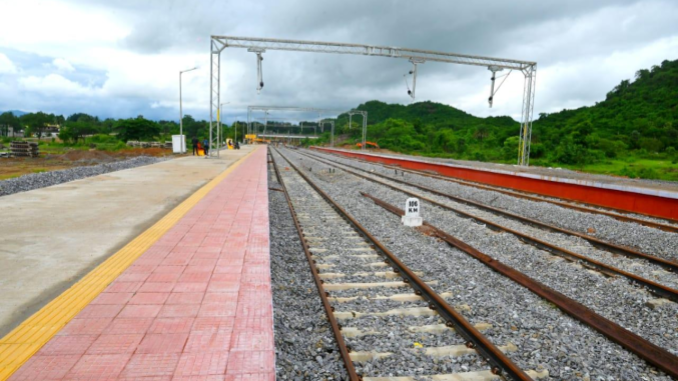
Under Vision 2024, as on 01st April, 2023, total 251 Railway infrastructure projects (76 New Line, 19 Gauge Conversion and 156 Doubling), covering total length of 29,147 km, costing 4.92 lakh crore in the entire country including those falling fully/partly in Uttar Pradesh, Madhya Pradesh and Maharashtra are in planning/sanction/construction stages, out of which 9,910 km track length has been commissioned and an expenditure of 2.45 lakh crore has been incurred up to March 2023.
More Details:
- Presently, the Ministry of Railways has taken up construction of two Dedicated Freight Corridors (DFC) viz. Eastern Dedicated Freight Corridor (EDFC) from Ludhiana to Sonnagar (1337 Km) and Western Dedicated Freight Corridor (WDFC) from Jawaharlal Nehru Port Terminal (JNPT) to Dadri (1506 Km). So far, 2196 km (EDFC-1150Km and WDFC-1046 Km) out of the total sanctioned length of 2843 km of DFC, has been completed.
- Speeding up of trains is a constant endeavour and a continuous process on Indian Railways (IR). IR has also undertaken rationalisation of time tables in a scientific manner with the assistance of IIT-Bombay, inter-alia to speed up train services by converting passenger trains to Express services and Express services to Superfast services.
- Further, Indian Railways has introduced Vande Bharat trains, which have higher speed potential. Till 21st July, 2023, 50 Vande Bharat trains have been introduced on the IR network.
- Presently, a High Speed Rail project namely Mumbai-Ahmedabad High Speed Rail (MAHSR) Project is undertaken with technical collaboration and financial assistance from the Government of Japan.
- The National Rail Plan mentions the following routes for future possible development for high speed rail network:
- Delhi – Varanasi
- Delhi – Ahmedabad
- Mumbai – Nagpur
- Mumbai – Hyderabad
- Chennai – Mysore
- Delhi – Amritsar
- Varanasi – Howrah
- Zonal railways had been delegated power to introduce discounts up to a maximum of 25% of basic fare in AC chair car and Executive class in order to optimise utilisation of accommodation (vide commercial circular no. 40 of 2019, dated 27.8.2019).
- This authorised zonal railways to offer competitive fares over certain segments after analysing the travel trends for all competitive modes in the region and also estimating the future occupancy potential.
- The same provisions were extended with some minor modifications (vide commercial circular no. 11 of 2023, dated 8.7.2023). Further, fare rationalisation is a continuous process to optimise utilisation of travel accommodation in trains.
- During the current financial year, 2023-24 (up to June 2023), the overall utilisation of Vande Bharat trains has been 99.60%.
- The operational cost depends on various factors including traction energy cost and traction energy consumption. It is a continuous endeavour of Indian Railways to reduce the operational cost of trains.
- Vande Bharat rakes have a regenerative braking system as its core design feature which feeds braking energy back to Over Head Equipment (OHE) and thus reduces traction energy consumption.
- This information was given by the Minister of Railways, Communications and Electronic & Information Technology, Shri Ashwini Vaishnaw in a written reply to a question in Lok Sabha.
Source: PIB- Press Release | Image Credit (representational): MoR

